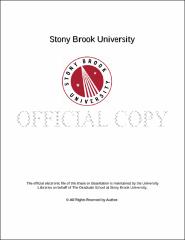| dc.identifier.uri | http://hdl.handle.net/11401/76550 | |
| dc.description.sponsorship | This work is sponsored by the Stony Brook University Graduate School in compliance with the requirements for completion of degree. | en_US |
| dc.format | Monograph | |
| dc.format.medium | Electronic Resource | en_US |
| dc.language.iso | en_US | |
| dc.publisher | The Graduate School, Stony Brook University: Stony Brook, NY. | |
| dc.type | Dissertation | |
| dcterms.abstract | This dissertation focuses on the Oper Frankfurt, a musical institution that has played an influential role in the development of operatic staging since the 1980s. Through an examination of productions staged at the house in two different periods (1979 – 1987 and 2010 – 2015), I pay particular attention to the ways in which these contemporary stagings contribute to a discourse about recent opera— particularly in Germany— and what has frequently been called Regietheater. This polemical term, often translated as “director’s theater,†connotes a provocative, theatrically experimental, even massively reenvisioned reading of an operatic work, propelled by a visionary stage director. Using a broad analytical approach that examines not only what David Levin has called the “performance text,†but also the specific creative context in Frankfurt, I question the utility of that term. Although charismatic directors like Hans Neuenfels and Ruth Berghaus are important within this history, my analyses make clear that production texts staged in Frankfurt since the 1980s exhibit a conception of authorship more multiplistic and collaborative than the director-centric notion taken for granted within music scholarship, the opera industry, and the media. Furthermore, I demonstrate that the staging trends visible in recent productions—even the most radical—are not necessarily coupled with a novel conceptual apparatus advanced by a willful director. As my analyses destabilize the relevance of the Regietheater label, other meaningful patterns emerge that I argue are more germane to comprehending developments in opera production since the late 20th century. My study is divided into two parts that parallel the periods profiled at the opera house: the “Gielen Era†and the last five years of the present administration. The first portion introduces my multilayered methodology, then examines radical stagings of the 1980s. The second half explores productions of the last decade and considers authorial voice, venue, experimentation and aura. In conclusion, I draw attention beyond a simple notion of Regietheater to more productive questions about today’s stagings, thus revealing an expansion of the parameters that define the operatic genre. | |
| dcterms.available | 2017-09-20T16:50:37Z | |
| dcterms.contributor | Lochhead, Judith | en_US |
| dcterms.contributor | Minor, Ryan | en_US |
| dcterms.contributor | Johnston, Keith | en_US |
| dcterms.contributor | Calico, Joy H.. | en_US |
| dcterms.creator | Chenault, Cordelia Elizabeth | |
| dcterms.dateAccepted | 2017-09-20T16:50:37Z | |
| dcterms.dateSubmitted | 2017-09-20T16:50:37Z | |
| dcterms.description | Department of Music | en_US |
| dcterms.extent | 524 pg. | en_US |
| dcterms.format | Monograph | |
| dcterms.format | Application/PDF | en_US |
| dcterms.identifier | http://hdl.handle.net/11401/76550 | |
| dcterms.issued | 2016-12-01 | |
| dcterms.language | en_US | |
| dcterms.provenance | Made available in DSpace on 2017-09-20T16:50:37Z (GMT). No. of bitstreams: 1
Chenault_grad.sunysb_0771E_12845.pdf: 32209727 bytes, checksum: dd238b5f5f3c1c1973837aa8a1e1ce96 (MD5)
Previous issue date: 1 | en |
| dcterms.publisher | The Graduate School, Stony Brook University: Stony Brook, NY. | |
| dcterms.subject | dramaturgy, Frankfurt am Main, opera, production, Regietheater, theater | |
| dcterms.subject | Music -- Theater history -- Performing arts | |
| dcterms.title | Beyond Regietheater: The Oper Frankfurt Behind the Curtain, 1979 - 2015 | |
| dcterms.type | Dissertation | |

